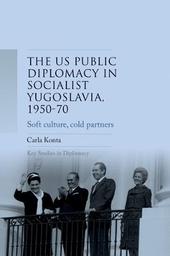
|
Us Public Diplomacy in Socialist Yugoslavia, 1950-70: Soft Culture, Cold Partners
Hardback
Main Details
| Title |
Us Public Diplomacy in Socialist Yugoslavia, 1950-70: Soft Culture, Cold Partners
|
| Authors and Contributors |
By (author) Carla Konta
|
| Series | Key Studies in Diplomacy |
|---|
| Physical Properties |
| Format:Hardback | | Pages:224 | | Dimensions(mm): Height 234,Width 156 |
|
| ISBN/Barcode |
9781526140753
|
| Classifications | Dewey:327.73049709045 |
|---|
| Audience | | Tertiary Education (US: College) | | Professional & Vocational | |
|---|
|
Publishing Details |
| Publisher |
Manchester University Press
|
| Imprint |
Manchester University Press
|
| Publication Date |
28 April 2020 |
| Publication Country |
United Kingdom
|
Description
Representing the first comprehensive account of the public and cultural diplomacy campaigns carried out by the United States in Yugoslavia during the height of the Cold War, this book examines the political role of culture in US-Yugoslav bilateral relations and the fluid links between information and propaganda. Tito and his Party allowed the United States Information Agency and the State Department's cultural programmes to enter Yugoslavia, liberated from Soviet control, open cultural centres and pavilions at its main fairs, broadcast the Voice of America, and have American artists tour the country. The exchange of intellectual and political personnel helped foster the US-Yugoslav relationship, yet it posed severe ideological challenges for both Yugoslavia and the United States. By providing new insights into porous borders between freedom and coercion in Tito's regime, this volume shows how public diplomacy acted as an external input for Yugoslav liberalisation and dissident movements. Building on extensive archival research and interviews, Carla Konta analyses the fluid links between information and propaganda, and the unintended effects that propaganda can produce beyond the control of producers and receivers. -- .
Author Biography
Carla Konta is a Lecturer in the Department of Italian Studies at University of Rijeka -- .
Reviews'It is hard to imagine a more difficult endeavour for US foreign policy makers than promoting public diplomacy in a non-aligned, socialist and proudly independent country such as Yugoslavia. Relying on a stunningly rich array of different sources, from US and Yugoslav archives, Carla Konta offers a detailed and original examination of this effort, its evolution during the Cold War, its limits, frustrations, incongruities, and achievements. This book is a welcome and important addition to a field of historical enquiry, the cultural Cold War and US post World War II public diplomacy, which has boomed in the past two decades, but that is often limited to the Western camp and the relations between the United States and its NATO allies.' Mario Del Pero, Professor of International History, SciencesPo, Paris 'Carla Konta's theoretically rich, archival-based study deepens our understanding of public diplomacy, and even better, our understanding of the cultural dynamics, internal or external, of one of the most significant reciprocal Cold War gambles: the constantly negotiated US-Yugoslav partnership. As a subtle, balanced, and thought-provoking analysis of soft power, shown here in its mutual aspects, this book is a must read for anyone interested in public diplomacy, within or beyond its Cold War manifestations.' Alessandro Brogi, Professor of History - US Foreign Relations, University of Arkansas -- .
|